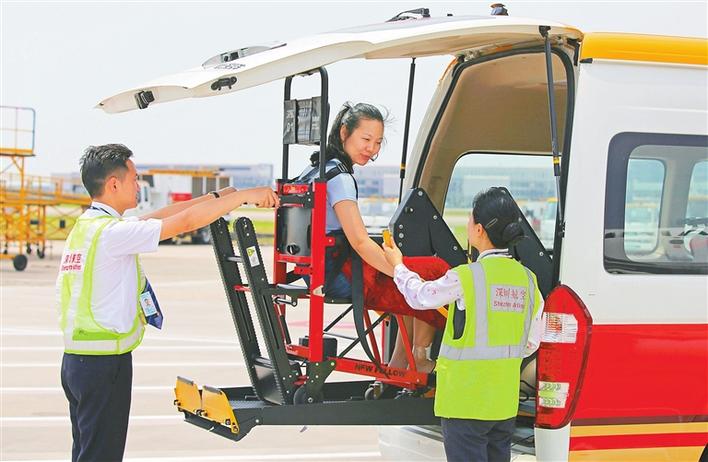
A wheelchair user is transported to board a plane by an accessible vehicle at Shenzhen Bao’an International Airport. Shenzhen Economic Daily
Shenzhen's regulations on barrier-free city construction, the first legislation of its kind in China, took effect yesterday, aiming to make life easier not only for the disabled, but also for the elderly, the sick and wounded, pregnant women, children and other people in need.
In the legislation, the city has integrated barrier-free concepts into all aspects of its development.
In terms of housing, the legislation stipulates that public and commercial housing projects should provide barrier-free homes according to relevant standards, and priority should be given to meet the needs of the disabled, the elderly and other special groups. Barrier-free residences should be marked on the allocation or sales lists of public and commercial housing projects. Property developers must disclose barrier-free housing information on their sales platforms.
In commuting and parking, transport terminals, public architectural facilities, commercial service venues and tourist attractions and parks, where elevators and escalators are needed, must be installed with barrier-free elevators to connect to nearby barrier-free facilities.
Service venues of government agencies and public organizations, public cultural facilities, transport hubs, tourist attractions, hospitals, department stores and hotels must designate accessible parking spaces for people with disabilities. Metro, bus and cab operators must be able to offer reservation services for disabled people.
Barrier-free information service is also included into the smart city construction. Public service websites must also adhere to barrier-free design standards. Television stations, libraries and other public service agencies must provide convenience to its audience in needs.
In addition, the regulations encourage telecommunication device manufacturers and enterprises to provide barrier-free technologies for information exchange and to offer support in terms of communications, remote medical treatment, education, navigation, online payments and shopping.
“The regulations are really good for physically challenged people. The improvement of barrier-free facilities will provide basic guarantees for physically challenged people to integrate into society, we expect it to be implemented,” Zhang Yingying, manager with Shenzhen Yuyan Disabled Persons Caring Undertaking Development Center, said.
Dong Xiu, chairwoman with Shenzhen Federation for Disabled Persons, said the regulations aim to enable the disabled, elderly, the sick and wounded, pregnant women, children and people in need to participate in social life safely, voluntarily and conveniently.



